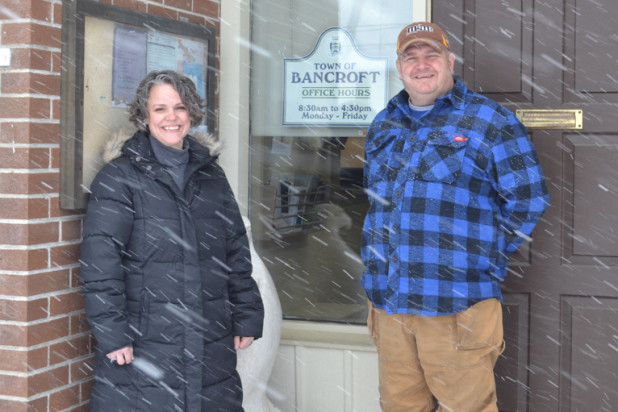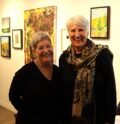Headline News
Freshman councillors reflect on their first year
December 23, 2015

Bancroft councillors Tracy and Barry McGibbon discuss their first year as representatives and their intentions for the years to come. TONY PEARSON Special to This Week
By Tony Pearson
“Municipal government is like marriage. To make it work, there has to be a lot of give-and-take, and those involved have to learn to compromise.”
Tracy and Barry McGibbon are new to Bancroft town council, but they have been a couple for more than 20 years, and so the comparison springs easily to mind as they continue to adjust to local politics.
They each ran for council for somewhat different reasons. Tracy had been active as a volunteer worker and board member, and had taken on the task of events co-ordinator for the town.
Her passion for the community made her feel she had something to contribute. Barry was concerned about a lack of representation for working people still raising children. He wanted to help make Bancroft attractive to younger families.
So far, one year into their four year terms, they’ve found some things are what they expected, but they’ve also discovered some things they didn’t expect.
Mostly, it’s questions of the time and process to get things done. Tracy finds that “I’m learning how much we don’t control as a town, because the authority lies with other levels of government.”
Barry notes that “you can’t get stuff done as quickly as you might expect. There are numerous protocols in place which specify the procedures you have to follow. It can seem like a snail’s pace, but on the other hand, you’re a lot less likely to make a mistake because of too much haste.”
Both Tracy and Barry find that they spend the largest amount of their time and energy communicating with their constituents, the taxpayers of their wards.
Sometimes it’s to correct misleading impressions or rumours.
“People get half of a story and become very upset,” says Barry. “We have to ensure they get all the facts”. Tracy agrees that a lot of her time is spent “smoothing over” reactions to incomplete or mistaken notions.
Despite difficulties, they continue to find council service satisfying.
“For anyone who grew up in Bancroft, it’s great to get a chance to make a difference to our community,” says Tracy. “It’s the ultimate phase of community service,” Barry adds.
Not that there aren’t frustrations. “You can’t make everyone happy,” Tracy notes.
“Sometimes you have to make decisions that are less than popular in your area for the greater good of the whole township and the region.” She finds that social media comments can get negative, seeming to bash almost everything that’s done.
Barry feels frustrated from time to time getting cohesion on council.
“We need to accept and respect each other’s opinions, even when we differ.” He also agrees with Tracy about the ongoing difficulties of reconciling constituents’ wishes with larger concerns.
“We can’t stay focused just on Bancroft,” he observes. “I think we need to look at the regional picture more. For example, sharing a fire department administration with Hastings Highlands makes sense; we need to look for other opportunities to collaborate more with our municipal neighbours.”
The McGibbons also are sometimes a little frazzled at managing the multiple responsibilities of council, their jobs, and their family.
However, over the years they have learned to juggle, and more important, to set priorities. “We’ve always been active – in our church, in sports and other activities with our kids, in community organizations,” Tracy notes.
“Now that our kids are older (15 and 17), we have more time for council.” However, Barry points out that it would be much harder for someone with small children. “And if you have a job,” he adds, “the fact that council meetings are during the daytime doesn’t help.” He’d like to see evening meetings for issues where the public may want input, such as bylaws and zoning.
As for their own goals for Bancroft, both want to see the township’s financial picture improved. Both want the debt load reduced, while saving for capital expenditures that are needed for an aging infrastructure.
Tracy has one expenditure she’d like to see: a splash pad for kids and families. She feels that attractions like this might get more tourists in transit to stop in Bancroft.
“People who stop can look around; if they do, they find that the town can meet most of their needs. So stopping leads to settlement.”
In addition, she points out that with its above-average portion of low income families, Bancroft needs facilities that don’t cost a lot of money to access.
Barry feels that the town also needs more events, especially those which produce revenue, not just for area businesses but the town itself.
He points to the Dungannon mud run, which he helped start, and which has generated a lot of money for fire department equipment.
As to the role of town council and administration in town development, both believe they can and should work to assist other groups and organizations. “We need to appreciate and value our volunteers, without trying to control what they do.”
Barry echoes the thought: “We need to support initiative – open channels to assistance, do promotion, provide encouragement – as our volunteers do their thing.” Both say that they think rather than always asking
“Why?” you have to ask “Why not?”
For all the frustrations, Tracy summed up her experience to date as a councillor with enthusiasm: “I love what I do. I love being able to work to develop Bancroft and North Hastings.”
Barry added: “It’s important to try things, even when you’re not assured of success. As a town, we need to be pro-active; it’s the path to growth.”

















